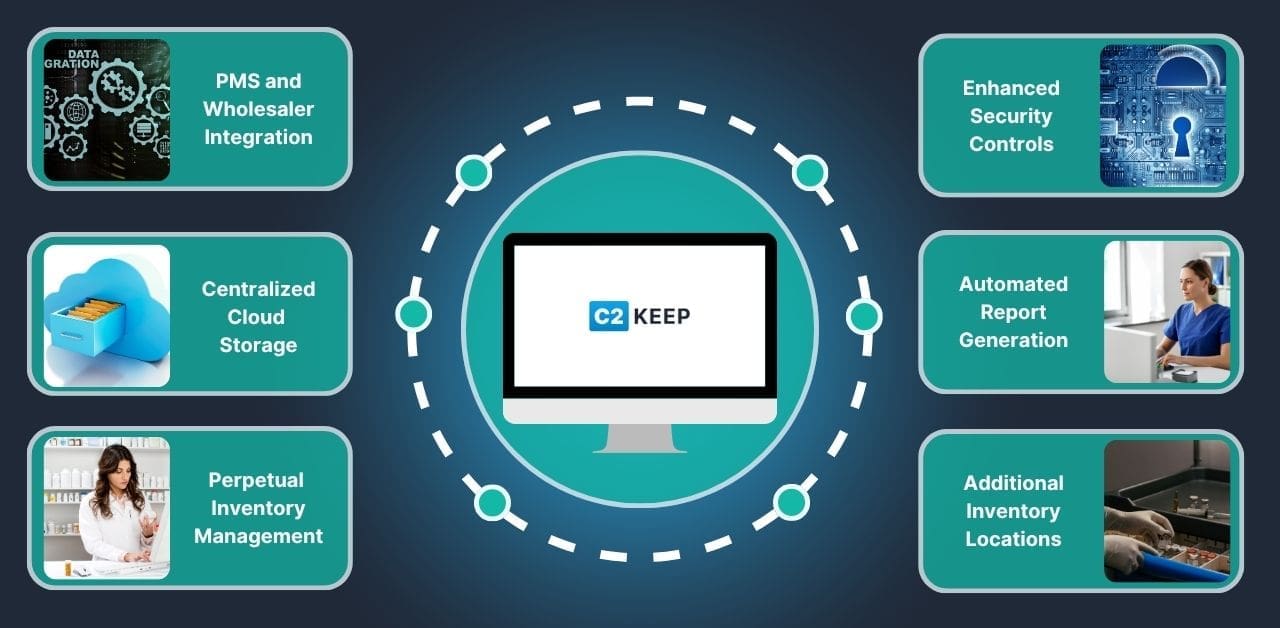Long-Term Care (LTC) pharmacies are a critical lifeline for millions of Americans managing complex, chronic conditions. Because these pharmacies handle controlled substances in high-volume, high-stakes environments, maintaining compliance is not just important, it’s essential to ensuring patient safety and regulatory accountability. Yet many LTC pharmacies struggle with persistent challenges: perpetual inventory management, reconciling discrepancies, unexpected audits, and keeping up with evolving regulations. These tasks demand significant time and attention, often pulling staff away from patient-focused care.
In this blog, we’ll outline what LTC facilities are, how they manage controlled substances, and the most common compliance challenges they face. We’ll also explore how C2 Keep, a digital compliance platform built specifically for managing controlled substances, helps LTC pharmacies stay organized, audit-ready, and confident in their daily operations. By streamlining compliance workflows, C2 Keep frees up valuable time and resources, allowing pharmacy teams to focus on what matters most: delivering safe, high-quality care and strengthening relationships with their partner facilities. Because when it comes to controlled substances, peace of mind isn’t a luxury, it’s a necessity.
A Brief Overview of LTC Pharmacies
Long-term care (LTC) pharmacies are defined by the Centers for Medicare & Medicaid Services (CMS) as pharmacies that are “either owned by or contracted with a long-term care facility to provide prescription medications to its residents.” Due to the nature of the patients they serve, such as those in assisted living or managing chronic illnesses, LTC pharmacies may handle a higher volume of controlled substances than typical retail pharmacies. They also play a more active role in medication management, working closely with facility staff to create tailored care plans. Given the stricter federal and state regulations governing these facilities, it is crucial for LTC pharmacies to maintain quick and accurate compliance workflows to avoid fines, diversion, and potential harm to patients and the community. However, many challenges still prevent LTC pharmacies from achieving effective compliance.
Common Compliance Challenges LTC Pharmacies Face
Staying compliant is not a one-time task for LTC pharmacies; it demands continuous monitoring, detailed documentation, ongoing staff training, and technology to streamline processes. The fast-paced and complex nature of the LTC environment, combined with strict federal and state regulations, leaves little room for error. Even routine tasks can become compliance risks without proper systems in place. Below are some compliance areas which often create challenges LTC pharmacies:
- Perpetual Inventory Management: The DEA requires LTC pharmacies to maintain a real-time perpetual inventory log for all Schedule II activities over the past 2 years. Keeping this log accurate and up to date is essential, but factors such as discrepancies, break-ins, and other diversion activities complicate things, especially when relying on manual processes.
- Document Organization: With so many moving parts in an LTC pharmacy, key records and forms can easily be misplaced. Failing to properly organize and retain essential documentation such as DEA 222 forms or CSOS records can lead to costly fines or even loss of DEA registration.
- Unexpected Audits: Regulatory audits can occur at any time, often with little warning. Without a way to promptly produce required records, these audits can become a stressful, labor-intensive task resulting in serious penalties.
- E-Kit Activity Tracking: LTC pharmacies must closely monitor controlled substances stored in emergency kits (E-kits or med banks) supplied to partner facilities. Tracking these movements accurately adds another layer of complexity to compliance, especially when multiple facilities or users are involved.
- Evolving Regulations: Federal and state regulations governing controlled substances continue to evolve. Staying current requires proactive monitoring and adaptability, as even minor regulatory changes can impact compliance protocols.
While these challenges are substantial, the right tools and systems can help LTC pharmacies stay compliant and operate with greater confidence and efficiency.
How C2 Keep Can Help

C2 Keep is a cloud-based, fully integrated solution designed to simplify controlled substance compliance. Founded by former pharmacy director Roland Achenjang, the platform was created in direct response to the frustrations he and his team faced with manual logbooks and outdated compliance workflows. What began as a tool to eliminate paperwork inefficiencies has grown into a comprehensive compliance hub that helps Long-Term Care (LTC) pharmacies manage controlled substances with confidence, accuracy, and ease.
Below are some of the ways C2 Keep helps LTC pharmacies overcome common compliance challenges:
- PMS and Wholesaler Integration: C2 Keep integrates with FrameworkLTC® and other leading Pharmacy Management Systems, as well as more than 15 primary and secondary wholesalers. These integrations streamline data flow, reduce redundant entry, and minimize the risk of discrepancies.
- Centralized Cloud Storage: All controlled substance documentation is securely stored in one centralized location, ensuring easy access and retrieval during audits. By keeping records organized and accessible, C2 Keep helps pharmacies maintain compliance while saving valuable time.
- Perpetual Inventory Management: C2 Keep automatically records and organizes all controlled substance activity in real time, meeting DEA perpetual inventory requirements. This automation reduces manual tracking errors and provides complete visibility into every transaction.
- Enhanced Security Controls: C2 Keep includes multiple safeguards that make diversion prevention more effective. Each user has a unique PIN, and transaction data cannot be altered without a documented alibi, ensuring accountability and traceability across all controlled substance activities.
- Automated Report Generation: Pharmacy teams can generate reports such as Inventory Totals, Current On-Hand, and DEA Compliance with just a few clicks. Custom reports can also be created to meet specific audit or internal needs, helping staff maintain compliance without slowing operations.
- Support for Additional Inventory Locations: C2 Keep accurately tracks controlled substance activity originating from e-kits, med banks, and other satellite locations. This activity automatically syncs into the pharmacy’s total perpetual inventory, maintaining a clear and complete compliance record.
By combining automation, integration, and secure digital recordkeeping, C2 Keep gives LTC pharmacies the tools they need to stay compliant, audit-ready, and focused on patient care.
Final Thoughts
Compliance challenges in LTC pharmacies are very real and often complex, but they don’t have to be overwhelming. At C2 Keep, our mission is to provide peace of mind by streamlining controlled substance compliance, empowering. By eliminating the inefficiencies of manual workflows, we help LTC pharmacies operate more confidently, efficiently, and effectively.
Ready to see how C2 Keep can transform your compliance process?
Schedule a free 30-minute demo with our founder and CEO, Roland Achenjang, and experience the difference firsthand.
